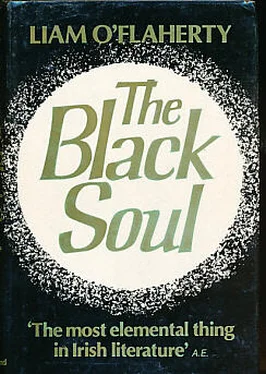For that whole week he was never conscious of Little Mary or her husband. They moved about him without his seeing them. Red John obeyed the spring like an automaton. He obeyed it unconsciously like the grasses that were being thrust from the earth in spite of themselves. His weak will revolted against life that was a joyless burden to him, but the remorseless wind lashed him into action. He worked ceaselessly mending baskets, splicing ropes, manuring the two fields in which he was preparing to sow potatoes, cutting seeds. And all the while his passion for Little Mary, fanned by the lustful spirit of spring, maddened him. But her glance terrified him. He saw that she was lost to him. He would look from her to the Stranger sitting slothfully by the fire, and his eyes gleamed with hatred. Then they changed immediately and distended with fear. Drear phantoms pursued one another through his savage unreasoning mind that brought his breath from his lungs in gasps. So he worked furiously without purpose to keep himself from going mad. He sowed, caring nothing whether he should reap or not. He no longer raged against his fate. The people about him lost interest for him. He could understand nothing. There was a great want within him continually demanding satisfaction, and he was unable to satisfy it. He wanted his wife. The wind of spring lashed the marrows of his bones, urging him to satisfy that want. The crazy structure of his reason lurched dangerously. He spoke to nobody and they shook their heads at him contemptuously, saying, ‘What a boor of a fellow. It’s avarice that makes him that way.’ Nobody cared to find the cause of his melancholy, least of all his wife, Little Mary. Spring was in her blood too, but it was to her an elixir that made her shiver with love of life. She moved jauntily, with a springing step, swaying from the hips. Her eyes glittered mischievously. The dimples in her cheeks when she smiled were lost in a thousand creases. Her teeth when she bared them in a laugh shone like ivory. She used to look at the Stranger sitting moodily by the fire and smile to herself. ‘Ha,’ she would say, ‘it is the beginning.’ It seemed that a skittish imp had entered her soul that was gentle and sad in winter. That imp transformed her. Her beauty, that was sombre in winter like the beauty of a mist-clad mountain, was now maddening like the beauty of a fountain in which sunbeams are sparkling.
Then one morning the Stranger awoke from sleep, conscious of all the activity about him. Sounds reached him from all sides of people working. They had reached him every morning for the past week, but they had flitted past unheeded. His mind, busy with its controversies, did not grasp their meaning. As he dressed he heard the bleating of a sheep coming down the lane at the back of the cabin. He went to the window and looked out. A peasant woman was carrying a newborn lamb in her arms. Its body, yellow with the shine of birth, hung awkwardly across her breast, its long legs dangling, its large ears drooping. A little boy running by the woman’s side kept stroking its head and skipped as he shouted, ‘Tuirteen a’m, tuirteen a’m.’ A sheep circled around bleating, a brier trailing from her haunch, her belly covered with hard pellets of earth that jingled as she ran. The woman held the lamb to the sheep’s nose now and again to ease her fierce anxiety.
The Stranger felt a pain in his chest looking at the sight. It appeared to be the embodiment of life to him, of spring, of awakening energy. Then with it came all the other sounds of life. From the cabin door he could see the whiteshirted men working in the fields beneath the village. The perspiration shone on the horses’ flanks as they galloped past him. Their dung smoked in the lane. The wind ran close to the earth with a whipping sound. He stood looking out motionless, as if amazed at the treachery of nature’s return to life and activity. He felt as bitterly alone as the roué, when all his boon companions have suddenly deserted vice for a life of virtue. He stood looking out of the door for fully half an hour, unable to understand it.
Little Mary was preparing his breakfast in the kitchen behind him. He could hear her humming a song carelessly as she moved about. The sound of water gurgling from the spout of the kettle into the teapot appeared strange to him, as if he had never heard it before. He was afraid to turn around to look at her, lest she too might have changed in the night with the rest of the world about him.
‘Your breakfast is ready,’ she said.
He wheeled about and looked at her. She moved to the window without glancing at him and stood looking out dreamily, arranging a curl of hair on her right temple. He stood by his chair staring at her as if she had done him an injury. He tried to think of something to say to her. But he couldn’t speak. Something fermented within him that tied his tongue to his palate. ‘Fuh!’ he said at last, querulously, and banged the chair against the ground. She shot him a coquettish glance and went out. Then he heard her calling loudly to her hens, ‘Tiuc! tiuc! tiuc! come here to me, you darlings,’ as if she had completely forgotten all about him. But she kept smiling to herself as she thought, ‘Now I can play with him.’
He gulped his breakfast, angry with himself. Then he walked about the kitchen excitedly. He put on his hat and coat to go for a walk, but he turned back from the door and took off his coat again. Then he swore when he realized that he wanted her. The memory of Kathleen O’Daly came before his mind. He found himself thinking religiously, he who was an atheist. ‘It would be a sin,’ he said to himself, standing by his bed. But the very thought aroused his passion the more. Then he laughed aloud at the incongruity of his thinking that such a thing could be sinful in the eyes of a man who scoffed at the world, in the eyes of a man who had … well, done all the things that men do when they cut adrift. He went into the kitchen and sat by the fire waiting for her. Then she came in. He smiled at her, but she never noticed him.
‘Is it cold outside?’ he said, wondering how he should approach her.
‘No,’ she said carelessly, shrugging her shoulders. ‘I’m going to the fields to spread seeds now. Would you like to come and watch?’
‘No, I would not,’ he said angrily. ‘The devil take the seeds!’ He put on his coat again and rushed out.
He wanted to go eastwards to Carmody’s public-house at Coillnamhan, but he found that he could not leave Rooruck. He kept circling around the field in which Little Mary was working. He fashioned all kinds of excuses to pass by that field. When he came near it, he talked to the peasants in the neighbouring field, and passed on without speaking to her. And then, coming up again to the cabin, he cursed himself for an utter idiot. His pride was insulted by the fact that passion was gaining the mastery over him. His winter apathy was slipping away from him. In fact, before dinner he shaved himself and trimmed his beard. He felt the lack of flesh on his bones, and wished that he was in better condition and less repulsive physically. And all the while some skittish imp kept smirking within him, hiding from his accusing conscience. He felt a quickening of his pulse and a warmth in his blood. He was almost dizzy with that strange feeling of spring. And it was completely physical, overpowering the mind like wine. In fact, it formed a mind of its own, with a distinct philosophy and a moral code. That mind seemed to be not in the brain but somewhere around the heart and the bowels. It shut out the past and the future, and demanded immediate satisfaction of its desires. It was cold and biting like the wind. It was irresistible.
While Little Mary was preparing dinner for him he watched her breathlessly, struggling violently with himself. In her presence he felt ashamed, conscience stricken. But when she was leaving the cabin to take Red John’s dinner to the field he caught her by the hand and looked into her eyes. She laughed and snatched away her hand. He swore. She stopped at the door and said in a rippling voice, ‘I’m in a hurry.’ Then she ran down the lane.
Читать дальше












